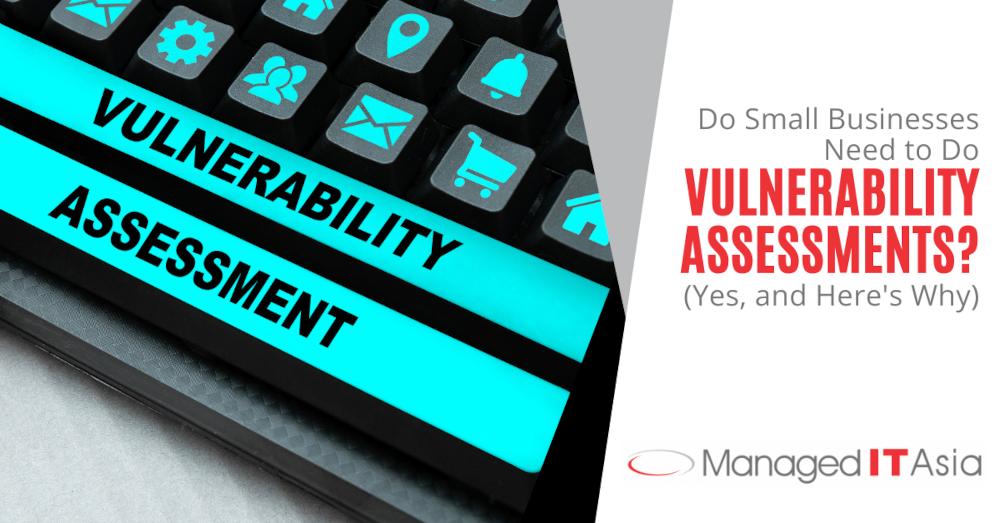Small businesses face a range of challenges as they strive to grow and succeed in today’s fast-paced business world. One of the most significant challenges is ensuring that their data and systems are secure against cyber threats. Cybercriminals target small businesses because they often have fewer resources and less robust security measures than larger enterprises. To stay protected, small businesses need to conduct regular vulnerability assessments. This article will explore why vulnerability assessments are essential and how they can benefit small businesses.
What is a Vulnerability Assessment?
A vulnerability assessment is a process that identifies weaknesses and vulnerabilities in a company’s IT infrastructure, applications, and systems. The goal is to find vulnerabilities before they can be exploited by cybercriminals. The assessment is usually conducted by a cybersecurity expert or a team of experts who use specialized tools to scan a business’s network, applications, and devices for vulnerabilities.
How Do Vulnerability Assessments Work?
Vulnerability assessments typically involve a combination of manual and automated techniques. Automated tools scan a company’s network, devices, and applications for known vulnerabilities, while manual techniques involve a cybersecurity expert manually probing for potential vulnerabilities. The first step in a vulnerability assessment is to identify the assets that need to be protected. This could include servers, databases, applications, and other devices. Once the assets have been identified, the cybersecurity team will scan them for vulnerabilities using specialized tools. The cybersecurity team will then analyze the results of the vulnerability scans to identify potential weaknesses and prioritize them based on their severity. They will then make recommendations for fixing the vulnerabilities and provide guidance on how to improve the overall security posture of the business.
Why Do Small Businesses Need Vulnerability Assessments?
Many small business owners believe that they are too small to be targeted by cybercriminals, but this is far from the truth. Cybercriminals target small businesses precisely because they are easier to exploit. Small businesses often have fewer resources and less sophisticated security measures, making them vulnerable to attacks. A single cyber attack can have devastating consequences for a small business. The costs of recovering from a cyber attack can be astronomical, and the reputational damage can be irreparable. A vulnerability assessment can help small businesses identify weaknesses in their systems and take action to fix them before an attack occurs.
What are the Benefits of Vulnerability Assessments for Small Businesses?
There are several benefits of vulnerability assessments for small businesses, including:
Identify Vulnerabilities Early
A vulnerability assessment can identify weaknesses and vulnerabilities in a business’s systems before they can be exploited by cybercriminals. By identifying vulnerabilities early, small businesses can take action to fix them before an attack occurs.
Cost-Effective
Conducting regular vulnerability assessments can be cost-effective in the long run. The cost of a vulnerability assessment is significantly less than the cost of recovering from a cyber attack. By conducting regular vulnerability assessments, small businesses can prevent cyber attacks and avoid the costs associated with recovery.
Maintain Compliance
Many industries require businesses to maintain certain levels of security compliance. Conducting regular vulnerability assessments can help small businesses ensure that they are meeting these requirements and avoiding potential fines and penalties.
Protect Reputation
A cyber attack can damage a small business’s reputation beyond repair. Conducting regular vulnerability assessments can help small businesses identify and fix vulnerabilities before they can be exploited by cybercriminals. This proactive approach can help protect a small business’s reputation and avoid the negative publicity that comes with a cyber attack.
Improve Overall Security
Conducting regular vulnerability assessments can help small businesses improve their overall security posture. Identifying weaknesses and vulnerabilities in their systems allows small businesses to take action to fix them and improve their overall security.
How Often Should Small Businesses Conduct Vulnerability Assessments?
The frequency of vulnerability assessments depends on several factors, including the size of the business, the complexity of its IT infrastructure, and the nature of its operations. However, in general, small businesses should conduct vulnerability assessments at least once a year. If the business handles sensitive data or operates in a highly regulated industry, more frequent assessments may be necessary.
Assess Your Vulnerabilities Today
Small businesses need to conduct vulnerability assessments regularly to ensure that their systems and data are secure against cyber threats. Conducting regular vulnerability assessments can help small businesses identify weaknesses and vulnerabilities in their systems, take action to fix them, and improve their overall security posture. By investing in vulnerability assessments, small businesses can protect their reputation, avoid the costs of recovering from a cyber attack, and ensure compliance with industry regulations. Contact Managed IT Asia to learn more about vulnerability assessments and how we can help your small business stay protected.
MANAGED IT ASIA, we are an IT Support, IT Solutioning and Managed IT Service Provider specializing in serving Small Businesses across Asia. Call us at +65 6748 8776 and let us manage your Small Business IT today!
